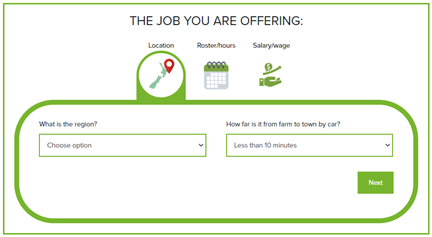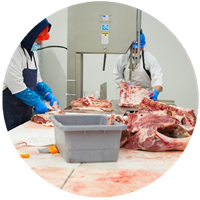Know the Market project
Initiated to help dairy farm employers understand the competitiveness of their Farm Assistant job offer, compared to employment opportunities in other sectors.
Finding people for dairy farming roles can be a challenge, due to the small pool of applicants. One way to grow this pool of applicants is to ensure the job offer is competitive compared to people’s employment choices in other sectors.
The Know the Market project has developed a Job Competitiveness Calculator which allows employers to input the terms of employment for the farm assistant job they are offering, and calculate how competitive it is compared to comparable jobs outside of dairy.
The results from the calculator, along with the insights and case studies on the target market are designed to help the employer assess if their role 'meets the market' and what factors could be tweaked to create a bigger pool of people interested in working on their farm.
See the number of potential people who might be attracted to working on your farm
Use this calculator to determine how competitive your farm assistant job offer is compared to options people have in other sectors.

People in careers outside of the dairy sector were interviewed as part of the Know the Market project to understand what could inspire them to choose a dairy farming job.
The candidates below have been selected due to their high potential to consider a farm assistant role. Expand the sections below to see what is attracting them - and alternatively what is putting them off.

What attracted you to your current job, and what do you like about it?
Relevant background: "My family were involved with many parts of the primary sector... they were also well-known in the machinery world. I did dairy farming at the weekends when I was in high school... since then I've also done some tractor driving and logging."
Fun: "I thought it would be a fun temporary job, and it turned out that even the bad days were good!"
Earning potential: "The harder you work, the more you earn with machinery. I am contracted to 40 hours (Monday to Friday), but I choose to do 50 so I earn more."
Flexible: "I like the flexibility of it too. They are very family friendly."
Outdoor - not behind the computer: "I didn’t want to be behind the computer anymore."
What would attract you to a dairy farming job?
The variety: "I enjoy that every day, you have to think about a wide range of things. In some jobs, you just do the same thing the whole time. A farmer has to be a jack of all trades. Variety is key for me."
The lifestyle: "One day, if I met a handsome guy, I think it would be better to raise kids in the country than in the city, from what I've seen of my friends' kids! You know, riding dirt bikes, learning farm skills, I appreciated that growing up and I want that for my kids too."
Why might you not/why haven't you considered a dairy farming job?
Pay: "Long term, I want to own my own farm. But it's easier for me to save up doing what I'm doing now."
Bad managers: "The last dairy employers I had were worse than the Kardashians! The farm wasn't properly managed... plus they made inappropriate comments about me [as a woman] which... made me very uncomfortable."
Run-down accommodation: "The house was run down and mouldy and I had to live with the manager."
Long hours: "The hours were very long. It varied by season but sometimes we were milking every 18 hours so we would end up working at midnight one day and midday the next. Your body isn't designed to have your sleep patterns messed with like that."
Isolation: "I was young and the isolation got to me too, not having a supportive team or family."
If a farmer offered you a job right now, what would convince you?
Good manager: "The right personality. I don't want to work for another angry boss!"
Opportunities to progress and learn: "I want to learn and progress, there has to be the opportunity to work my way up to eventually running my own business."
A reasonable roster: There has to be a good rotation. Unless you own your own business and benefit directly, things like 18-hour milking aren't okay. If you are just an assistant or manager, you should be doing reasonable hours and days."

What attracted you to your current job, and what do you like about it?
Pay: "I was attracted to the job because of the pay opportunities, I earn well."
Incentives: "There are really good incentives like a production bonus and medical insurance. They provide transportation too, we can use the vehicle to get to work, to go shopping, things like that. We get paid time and a half Fridays too."
Work-life balance: “It is a good work-life balance, we never work weekends.”
Opportunities and training/progression: "It's pretty cool actually, they encourage everyone to move up... There are opportunities to move towards technical stuff, like, an apprentice engineer, dealing with the machinery, or from a B grade to an A grade job too (the A grade jobs are more physically demanding and pay more)... you can become an MPI too (a Meat Processing Inspector)... maybe I'll become an MPI - but I'm not sure at this stage."
What would attract you to a dairy farming job?
Pay: "I assume it is better pay than what I earn, is it? You are working with big animals so I guess so."
Something different: "Just something different. I've been in my job for 2 years now, sometimes you want a change. I did a stint in a beef plant."
Accommodation: "Would I have to find my own accommodation or could I live on-site? It would be easier to live on-site. The housing is definitely an important one."
Why might you not/why haven't you considered a dairy farming job?
Work every day: "Do they work every day? I think they do right? It's a job you have to do every day. Seems like a harder work-life balance than my current job. I'd do it as long as I got a day or two off per week."
Friends: "I guess I would miss the mates I've made (if I left my current job), but you can always make friends everywhere I reckon."
If a farmer offered you a job right now, what would convince you?
Pay: "It would have to be better pay than what I'm making now, or there would be no point in swapping."
Hours and work-life balance: "The scheduling, the work-life balance is important."
Accommodation: "The housing."

What attracted you to your current job, and what do you like about it?
Outdoors: "I wanted something outside."
Work with hands: "I wanted to work with my hands - I liked working with the tractors on my parents dairy farm."
Opportunities and training/progression: "There are definitely opportunities, for example, opportunities to go overseas to work on bigger equipment. You could also go into manager roles, mentor roles, you can probably get your own business."
What would attract you to a dairy farming job?
Outside: "It's also outside."
Good people: "Generally you are working with good people."
Variety: "There is never a dull moment on the farm."
Why might you not/why haven't you considered a dairy farming job?
Early starts: "Oh the early mornings, that's the deal breaker. My parents get up at 4.45am."
Managing staff: "My dad owns his farm and he has had some rough patches., mainly around managing staff. He hires a lot of young people and trains them up well but sometimes they just don't listen. I guess being a mechanic, I don't have to manage people, I just have to manage machinery!"
The tools: "I'd miss being on the tools, I really enjoy that side of it."
If a farmer offered you a job right now, what would convince you?
Pay: "Oh money! I'd probably just be convinced if it was more money."

What attracted you to your current job, and what do you like about it?
Being hands-on: "I like doing hands-on stuff, building interests me."
Mathematics/problem solving: "It also uses my brain and stuff. I've always been interested in mathematics."
Already had a connection: "I was looking for a general job in the trades and my mate's dad had a company - he offered me a job."
Enjoy weekends off: "I get to enjoy my weekends as well as I only work Monday to Friday."
Good pay: "It's pretty good, I mean I'm not earning minimum wage."
The people: "The people I work with are good."
The training/progression opportunities: "The apprenticeship is 4 years long, but then I'll be fully qualified. I want to stick with the same company for a bit, but long term, I'd like to have my own business. In terms of training, I haven't had any particular training, but I learn as I do the work. Next year I'll have exams."
What would attract you to a dairy farming job?
Working with animals: "It seems pretty interesting, like working with animals like cows."
Working alone and with a team: "I guess when you are working on a farm, you are pretty much working by yourself right? I like working alone sometimes."
Feeding the world: "It's doing something important too, I mean, without farmers there wouldn't be food."
Why might you not/why haven't you considered a dairy farming job?
Early starts: "I do hear it has got early mornings, like 6am, that's my turn-off. In my job now I have to start at 8am and that is early."
Time off: "If I had two days off a week though, I guess there wouldn't be anything else that would put me off but I suppose if you are running your own farm, you have to constantly be there."
Knowing about opportunities: "My uncle is a farmer, and I've been there a couple of times. I haven't done any work there on his farm though. I guess because he owns his own farm, I had always assumed that to be a farmer you had to own your own farm, so I never looked into it too much."
Going to different sites: "I might miss going to different sites, that is quite cool I guess, always being at a different house. I don’t think there is anything [else] too specific about building I’d miss. Farming is probably just as physical."
If a farmer offered you a job right now, what would convince you?
Pay: "I don't think I would do it right now, I would want to finish my apprenticeship. I'd only do it if it was really good pay, it would have to be pretty high."

What attracted you to your current job, and what do you like about it?
Being hands-on: "I always wanted to do a hands-on trade. I was looking at a plumbing apprenticeship but decided to go electrical."
Variety: "I probably enjoy the variation of work. We do residential and commercial, there is lots of learning to do."
Already had a connection: "A friend of mine owned a business and offered me the job. It was just convenient because it was local and my friend owned the business."
Progression opportunities: "Once you are qualified there is progression. One of the guys is going off to start his own branch now. Maybe I'd own my own business one day."
Working with others: "Most of the people are good people to get along with as well. They are all in the same age bracket as me. We do things in a team of two and you work with different leaders on each job."
What would attract you to a dairy farming job?
The machinery: "I did think about it a little bit about a year and a half ago. A friend of mine has a farm and she let me have a burn around on her digger, tractor, truck.... that was quite fun, it was a good learning opportunity and I love learning."
The variety - even the paperwork: "I like variety, I'd be happy to do the paperwork too."
Why might you not/why haven't you considered a dairy farming job?
Long hours: "I don't mind getting my hands dirty, so that isn't a problem but the one thing would be the very early starts and late finishes. I think these hours wouldn't work in with my kids. One of my kid's rugby coaches is a farmer and he always looks tired."
Milk price: "My friend and I a while ago looked into whether we could start something up together on his property. But we were put off by the council regulations for the chickens, and also how Fonterra was doing. It seems to be doing better now but at the time we didn't feel sure about it. Those two things shut our ideas down quickly."
If a farmer offered you a job right now, what would convince you?
Pay: "It would possibly come down to money."
Training support: "The work environment would be important too. I don't think I would enjoy working completely by myself or not for a very long time. I wouldn't be confident enough in my knowledge of farming without proper training."
The Know the Market project team surveyed people who fit the profile for a dairy farm assistant role, but aren't currently in dairy, to learn about what would attract them to the sector.
Every person is different, and no survey can fully capture all the factors that go into a decision to start a new job. This means findings aren't definitive answers - but they are indicative. The sections below discuss seven findings from the project.
Higher pay means more applicants
The survey results allow us to make an estimate of the increase in the number of people that would be interested in a dairy farm assistant job as pay increases. This is seen in the chart below. The value of this chart is less about the specific pay rates that people would accept a job at, and more about the differences in the number of people interested as pay changes.
At $25 per hour, about 40% of the survey respondents said they would consider a dairy farm role. This increased to about 60% for $30 per hour and to about 80% at $35 per hour. Interestingly, the final 20% were not interested even when the pay increased to $45 per hour. This result indicates that roughly twice as many people would be interested at $35 per hour than at $25 per hour. At an industry-wide level doubling the number of people interested is likely to be more than enough to address the workforce shortage.
One related insight (albeit not a survey finding) is that once you have set a great wage/salary, you need to advertise it - as it is by far the most commonly reviewed factor within job advertisements (see research here).
Long hours may be fine, but must be paid
The responses to the survey suggest that many potential employees are happy to work more than 40 hours weeks as long as they are paid a full hourly rate for their time. In many cases the respondents were already working more than 40 hours per week in their current roles – see case studies above on page.
Presumably there is a point at which very long hours become a barrier and employees might expect a premium to their hourly rate for the additional hours worked. Our survey was not precise enough to establish what this premium would be.
Rostered days off are crucial
Roster patterns appeared to matter more to the survey respondents than the total hours they worked. Although the numbers need to be seen as indicative rather than exact, they highlight that rosters with few days off have a very significant impact on the way the job is perceived by potential employees who, for the most part, are used to working 5-day weeks.
The importance of days off was raised in interviews also - see case studies above on page.
Location matters less than you think
Working away from town was a factor that some people took into account when considering a job, but it was much less important than days off. That said, a remote location does have a cost in the minds of some respondents. Respondents indicated that they would look for up to $6000 in additional pay for living 21 to 30 minutes from town.
Early starts may need extra pay
The survey explored the issue of early starts in a different way than hours, rosters and location. It asked respondents directly how much more they would expect to be paid to start at 5am rather than 6am.
The way that people answered this question may not be a perfect reflection of how they would actually behave if they were given this choice in real life. However, the survey data suggests that views vary, with some not worrying about early starts and others requiring more pay to offset them.
A good team culture is as important as hours
We know that a good boss and a good workplace culture matter to people. These came up, for example, in interviews - see case studies on page.
These factors are not in the calculator because it's difficult for an employer to assess their own workplace, and to assess themselves as bosses. What we did do, is ask some questions that provide a sense of how important a good workplace is to people and, within this, what attributes matter most.
A good team culture was rated less important than pay and rosters, but it was up there with hours, and was rated as more important than several other factors - including even early mornings.
People want a great boss and career opportunities
When asked more about this good team culture, people tended to say that having a caring manager and training opportunities was more important than flexible hours and opportunities for social connection.
In today’s tight labour market, we need to ensure our dairy farm assistant jobs are attractive and competitive – but how? In this episode, find out about DairyNZ’s new tools to help farm employers know if their job role 'meets the market' and what factors could be tweaked to create a bigger pool of applicants. Our guests are DairyNZ’s Geoff Taylor and Pouarua Farms CEO Jenna Smith.